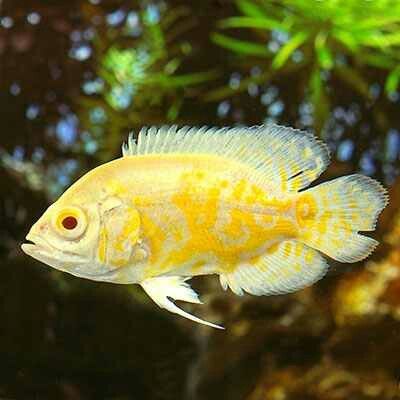Mia's Blessing Petshop
F87 Lemon Oscars
F87 Lemon Oscars
Couldn't load pickup availability
Key Characteristics of the Oscar:
Size: Oscars are large fish and can grow quite quickly. In a spacious aquarium, they can reach lengths of 12 to 14 inches (30 to 35 cm), with some individuals even growing larger in optimal conditions. It's important to provide them with a large tank to accommodate their size.
-
Coloration: Oscars are known for their vibrant and varied coloration. They often have a base color of dark gray or black with bright orange, red, or yellow markings. Some have spots or patterns on their body, making them visually striking. Over time, their colors can change and evolve based on their age, mood, and environment.
- Varieties: There are several color morphs, such as Tiger Oscars, Red Oscars, and Albino Oscars, which all vary in their color patterns but share similar care requirements.
Shape: Oscars have a robust, oval body shape with a slightly compressed profile. They have large, round eyes and are equipped with sharp teeth, which they use to catch and eat their food in the wild. Their dorsal and anal fins are long, giving them a graceful, fluid movement in the water.
Behavior:
Intelligent: Oscars are often considered one of the most intelligent freshwater fish species. They can recognize their owners and may even learn to interact with their caretakers. Some Oscars can be trained to perform tricks, such as coming to the surface for feeding or even following fingers or objects near the tank.
Curious and Interactive: They are highly curious and will explore their environment. Oscars will often swim up to the glass and "look out" at you when you approach their tank. They are known for their ability to "play" with decorations or interact with their reflection.
Aggressive: Oscars have a reputation for being territorial and aggressive, especially as they mature. They may fight with other fish, particularly smaller species or other Oscars of the same gender. It's important to keep them with tankmates that are large and robust enough to handle their sometimes dominant behavior.
Social but Territorial: While Oscars can develop strong bonds with their owners, they can also become very territorial, especially during breeding. It's a good idea to provide them with plenty of hiding spots and a spacious tank to minimize aggression.
Care Requirements:
-
Water Conditions:
- pH: Oscars prefer slightly acidic to neutral water, with a pH range of 6.5 to 7.5.
- Temperature: They thrive in warmer temperatures, ranging from 75°F to 80°F (24°C to 27°C).
- Hardness: Oscars prefer soft to moderately hard water, with a general hardness (GH) between 4 to 12 dGH.
- Water Quality: Oscars are particularly sensitive to poor water conditions. Regular water changes and a powerful filtration system are essential to keep their tank clean, as they produce a significant amount of waste. Ensure that the water is well-oxygenated with an efficient filter system.
-
Tank Setup:
- Tank Size: Given their large size and active nature, Oscars need a minimum of 55 gallons for one fish. If you want to keep multiple Oscars or house them with other large species, a 75-gallon tank or larger is ideal. A larger tank also helps to diffuse aggressive behavior and provides them with more space to swim.
- Substrate: Oscars can tolerate a variety of substrates, including sand or gravel, but sand is often preferred because it's gentler on their sensitive barbels and fins.
- Aquascaping: While they appreciate having some decorations and hiding spots, Oscars are known to rearrange their tanks, so you may need to secure decorations or rocks to prevent them from being moved around. They also enjoy having open swimming spaces.
- Filtration: A high-quality filtration system is essential, as Oscars produce a lot of waste. Consider using a canister filter or a powerful hang-on-back filter to maintain water quality. Make sure to perform regular water changes (about 25% every 1-2 weeks) to keep the water parameters stable.
-
Diet:
- Carnivorous: Oscars are primarily carnivores in the wild, feeding on a variety of prey, including smaller fish, invertebrates, and even some plant matter. In captivity, they can be fed a diet of high-quality pellets, live or frozen foods (like shrimp, worms, and fish), and occasionally, some vegetables.
- Feeding Tip: Offer a variety of foods to maintain their health and vibrant coloration. You can provide them with a mix of live or frozen foods (like bloodworms or brine shrimp), as well as nutritious pellets designed for large cichlids.
- Feeding Frequency: Oscars have hearty appetites, so feed them 1-2 times a day. They are prone to overfeeding, so be mindful of their portion sizes to prevent obesity or water quality issues from excess food.
Reproduction:
-
Breeding: Oscars are known to be relatively easy to breed in captivity, especially if they are well-fed and in optimal health.
- Courtship: During the breeding season, Oscars will display more vibrant colors. They engage in a courtship ritual, where the male will chase the female and perform various displays of strength.
- Eggs: Oscars lay their eggs on flat surfaces like rocks, decorations, or aquarium glass. The female can lay hundreds or even thousands of eggs, and the male will fertilize them.
- Fry Care: After the eggs hatch, the fry will remain in a protective area near their parents, who will guard them fiercely. The fry can be fed baby brine shrimp or finely crushed food until they are large enough to eat adult food.
Additional Notes:
Hardiness: While Oscars are relatively hardy, they are still sensitive to poor water conditions. Stable water temperature, good filtration, and regular maintenance are crucial to keeping them healthy.
Lifespan: Oscars can live for 10-15 years, sometimes longer, when properly cared for.
Fun Fact: Oscars are often referred to as "the dogs of the fish world" due to their friendly and interactive behavior. They can recognize their owners and may even learn to take food from your hand.
Tankmates:
Given their aggressive and territorial nature, it's important to choose tankmates carefully. Some potential tankmates for Oscars include:
- Large, peaceful cichlids (e.g., Severums, Green Terrors, or other large South American cichlids)
- Larger catfish (like Plecos)
- Large, non-aggressive species (such as Silver Dollars or large Barbs)
Avoid keeping Oscars with small or timid fish that might be bullied or eaten. Oscars are also known to eat small tankmates, including shrimp or fish smaller than themselves.
Share


